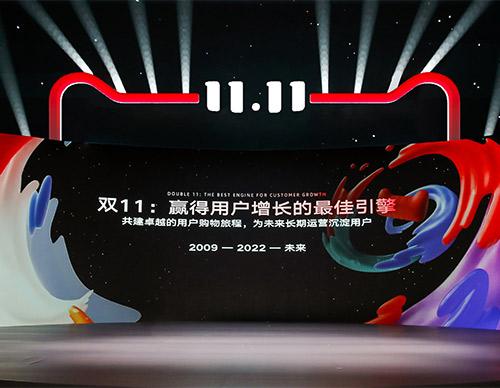Alibaba kicks off ‘Singles Day’ with presale event
The 14th annual edition of the annual Alibaba Global Shopping Festival (known colloquially as “11.11” or “Singles Day”) is starting early.
Alibaba Group Holding Ltd. commenced a presale on its Tmall digital shopping mall platform on Monday, Oct. 24. Two check-out windows will follow – the first window will begin at 8 p.m. Beijing time on Monday, Oct. 31 and end on Thursday, Nov. 3, while the second window will last from 8 p.m. Beijing time from Thursday, Nov. 10 to Friday, Nov. 11.
The 2022 edition of Singles Day features more than 290,000 participating brands. Retailers will have the capability to host self-run livestreaming sessions during the event through the Taobao Live livestreaming platform. Alibaba says it will offer marketing exposure and customer targeting assistance to newly-launched livestreaming channels.
In addition, Alibaba says it will support participating retailers with loyalty member recruitment, along with other initiatives, to promote the broader use of membership systems on its platforms.
Alibaba will also provide retailers with access to business intelligence tools and financial support. For example, the company will make a marketing analysis tool available to all retailers on the Taobao and Tmall platforms for the first time during the event. Tmall and Taobao will also provide faster payment transfers during Singles Day, with the goal of halving the account receivable cycle to seven days on average for certain products.
To provide cross-border logistics support, Alibaba’s Cainiao logistics subsidiary has further streamlined warehousing, customs clearance, line haul and distribution for Singles Day. It has increased the number of its import line haul routes by 20% and doubled the capacity of its self-operated bonded warehouses.
For export from China, Cainiao is collaborating closely with Alibaba’s AliExpress international e-commerce platform to offer delivery services within a committed timeframe and late-delivery compensation in various markets.
2022 will see more initiatives aimed at sustainability during the event. Tmall has ramped up efforts to label low-carbon products covering extended shopping categories such as apparel, food and cosmetics, apart from existing labeling for energy-efficient electronic goods. The new product label aims to help consumers better identify low-carbon products on the platform and check their purchases’ impact on the environment.
Tmall has also collaborated with over 40 brands to initiate a green campaign to promote low-carbon products through various initiatives. For instance, 10 brands, including Procter & Gamble and ThinkPad, have co-branded with Tmall to offer sustainable shopping bags as free gifts for consumers.
In addition, Tmall together with Alibaba Cloud, the digital technology and intelligence backbone of Alibaba Group, have leveraged the cloud unit’s carbon management platform Energy Expert to provide online carbon footprint modeling.
The 11.11 Global Shopping Festival began in 2009 with participation from 27 retailers. In 2021, Alibaba reported a final GMV of $84.54 billion (in U.S. dollars). This figure came in ahead of the formerly record-setting total of $74.1 billion reported for Alibaba’s 2020 Singles Day event, which in turn more than doubled the previously record-setting $38.4 billion in GMV Alibaba generated during 2019 Singles Day.
Singles Day has been an 11-day event since 2020. Before that time, it had been a 24-hour promotion with some preview sales.
“11.11 this year will have the most diverse range of products in the event’s history, with 17 million products available to more than one billion annual active consumers on our platforms in China, thanks to the support of our brands and merchants from around the world,” said Chui Xue, president of industry development and operation center of Taobao and Tmall, Alibaba Group. “Transforming consumer awareness into customer loyalty is key to generating the best return on investment. We will introduce technology and business innovations while enhancing supply-demand matching and loyalty membership management, to support our brand and merchant partners.”



